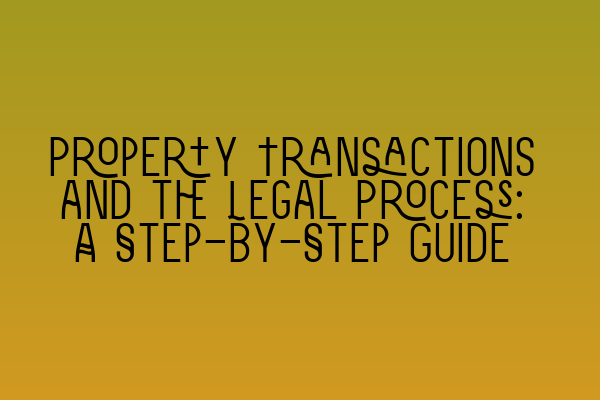Property Transactions and the Legal Process: A Step-by-Step Guide
When it comes to property transactions, understanding the legal process is crucial. Whether you are buying or selling a property, it is important to be aware of the steps involved to ensure a smooth and successful transaction. In this comprehensive guide, we will take you through the key stages of a property transaction, providing you with a step-by-step breakdown of the legal process.
Step 1: Instruction
The first step in any property transaction is to instruct a solicitor who specializes in property law. Your solicitor will act on your behalf throughout the process, guiding you and ensuring that all legal requirements are met. At SQE Property Law & Land Law, we have a team of experienced solicitors who can provide expert advice and representation.
Related article: SQE 1 Practice Exam Questions
Step 2: Preliminary Checks and Searches
Once you have instructed your solicitor, they will conduct several preliminary checks and searches to gather essential information about the property. These may include:
- Local authority searches to check for any planning permission issues or outstanding enforcement notices.
- Environmental searches to identify any potential contamination or flood risks.
- Land registry searches to ascertain whether the property is registered and to obtain the official title register and plan.
- Water and drainage searches to confirm the property’s connection to utilities.
These searches are crucial in identifying any potential issues that may affect the property or its value. Your solicitor will review the search results and advise you accordingly.
Step 3: Drafting the Contract
Once the preliminary checks and searches have been completed, your solicitor will draft the contract. The contract will outline the terms of the agreement between the buyer and the seller, including the purchase price, deposit amount, and any special conditions. It is essential that the contract is carefully drafted to protect your interests and ensure that all legal requirements are met.
Before the contract is finalized, your solicitor will review it with you and negotiate any necessary amendments with the other party’s solicitor.
Step 4: Exchange of Contracts
The exchange of contracts is a significant milestone in the property transaction process. At this stage, both the buyer and the seller become legally bound to proceed with the transaction. The exchange typically takes place over the phone, with both parties’ solicitors confirming that the contracts are identical and exchanging them.
Once contracts are exchanged, the completion date is set, and both parties are committed to completing the transaction on that agreed-upon date. It is important to note that if either party pulls out after the exchange of contracts, they may face severe financial penalties.
Before the exchange of contracts, your solicitor will advise you on the contents of the contract and ensure that you fully understand your obligations.
Step 5: Completion
On the scheduled completion date, the balance of the purchase price is transferred from the buyer’s solicitor to the seller’s solicitor. Once the funds are received, ownership of the property is legally transferred to the buyer.
Your solicitor will ensure that all necessary documents are executed, including transfer deeds and mortgage documents, if applicable. They will also handle the payment of any outstanding fees or taxes, such as stamp duty land tax.
Following completion, your solicitor will register the property in your name with the Land Registry and provide you with a copy of the registered title.
Related article: SQE 1 Practice Mocks FLK1 FLK2
Step 6: Post-Completion Matters
After completion, there are several post-completion matters that your solicitor will handle on your behalf. These may include:
- Notifying relevant parties of the change in ownership, such as utility companies and the local council.
- Handling the payment of any outstanding fees, such as estate agent fees.
- Providing you with a final completion statement and details of any remaining funds.
Your solicitor will ensure that all loose ends are tied up and that you have a smooth transition into your new property.
Conclusion
Property transactions can be complex, and understanding the legal process is essential to navigate them successfully. By following this step-by-step guide, you can have a better understanding of the stages involved in a property transaction and the role of your solicitor throughout the process.
At SQE Property Law & Land Law, our team of solicitors has extensive experience in property law and can guide you through each stage of your property transaction. If you require professional legal assistance or have any further questions, contact us today.
Related articles:
